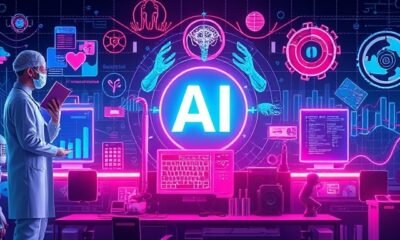Artificial Intelligence
Unlocking the Power of Artificial Intelligence in Automating Healthcare Data Analysis
AI technology revolutionizes healthcare through automated data analysis which improves medical efficiency while delivering better hospital results. The inevitable implementation of artificial intelligence requires medical professionals to solve ethical challenges before medical applications can be responsibly and equitably adopted.

Medical data analysis remains a crucial process which demands both precision and speed and specialized expertise. What if this process needed simplification which would deliver both time savings and better insights? The use of artificial intelligence for automated data analysis represents the key to this transformation.
Definition:
Medical institutions process massive datasets on a daily basis which include both patient documentation and medical visualization records. Medical data analysis through traditional processes delivers results which are slow, contain errors and limit the data’s potential for maximum utilization. Through its automation capabilities AI gives healthcare professionals advanced tools to analyze data quickly while making better decisions.
What is Data Analysis Automation in Healthcare?
Replacement of traditional manual analysis methods with AI algorithms and tools which perform healthcare data analysis marks the definition of Data Analysis Automation in Healthcare.
The elimination of repetitive work by automated data analysis systems produces results at breakneck speed while maintaining scalability. Traditional data analysis methods become obsolete as workloads grow because the increased data volume outpaces their capabilities.
Why automation matters?
- Speed Matters: AI processes data faster than human analysts.
- Error-Free Results: Automated processes eliminate the human errors that appear in traditional manual data handling procedures.
- Scalable Analysis: Handles exponential growth in data without additional effort.
- Real-Time Data Processing: Through automation organizations achieve real-time data analysis capabilities which deliver operational insights instantly after data generation. Sales in healthcare become vital due to the life-saving potential of timely interventions.
- Cost-Effectiveness: Automation leads to substantial cost savings because it decreases the requirement for large amounts of human workers. Organizations gain freedom to use their saved resources for developing innovative systems and value-oriented projects.
- Predictive Analytics: AI-powered tools integrated into automated systems use historical data patterns to generate forecasts about trends and outcomes. The predictive capabilities help industries take proactive steps which range from patient risk identification to logistics optimization.
- Improved Decision-Making: Organizations gain access to complete and precise data analytics through automation so stakeholders can make objective results-driven decisions.
- Enhanced Patient Outcomes: Healthcare treatment quality along with recovery rates improve because providers receive precise data insights and automated delivery of routine tasks enables them to concentrate on patient care.
- Workflow Efficiency: Departments experience both higher productivity and smoother workflows because automated tasks now finish in seconds which previously needed manual input during hours.
- Advanced Data Security: The implementation of automation provides industries particularly healthcare and finance with substantial security mechanisms which protect sensitive information from breaches and unauthorized access.
- AI-Driven Clinical Insights: Machine learning algorithms examine large datasets to discover vital clinical insights which help medical teams diagnose and treat complex diseases more efficiently.
- Streamlined Regulatory Compliance: The continuous monitoring function of automation ensures proper regulatory compliance through procedure updates that minimize both non-compliance risks and potential penalties.
- Integration with Electronic Health Records (EHR): The automated system connects with EHR platforms ensuring correct latest medical records exist while reducing administrative costs.
- Increased Accuracy in Diagnosis: The incorporation of AI in diagnostic processes leads to more precise outcomes while improving both system reliability along with the development of customized treatment approaches that match patient-specific needs.
- Automation of Routine Healthcare Tasks: Healthcare automation implements regular medical procedures from scheduling to billing to provide professionals additional time for handling essential duties.
By leveraging AI the extensive process of data analysis leads to immediate actionable insights.
Role of AI in Automating Data Analysis:
AI implements what changes healthcare data analysis goes through. Multiple technologies enable AI systems to automate complicated operations.
Algorithms in Action:
AI algorithms analyze huge datasets at high speed to produce exact findings. The analysis process becomes dramatically shorter through their help.
Prepping Data with Precision:
The ability to clean and prepare data through AI tools surpasses all the capabilities of standard spreadsheet software. The standardization of data formats alongside duplicate removal and gap completion occurs within a short period.
Decoding Complex Patterns:
AI performs complete data analysis across expansive information sets to identify patterns which human analysis would have missed. For example, identifying disease trends.
Turning Data Around in Real Time:
Doctors now use real-time AI analysis to obtain instant updates for both medical imaging and patient historical data processing. AI empowers them multitask effectively.
Machine Learning for Predictive Analytics:
Machine learning transforms predictive analytics through its ability to analyze large datasets which produces forecasts of upcoming trends and predictions. Through the application of these algorithms healthcare providers can determine proactive actions that enhance both treatment strategies and patient results.
Natural Language Processing for Medical Records:
Healthcare professionals can simplify complex management tasks of unstructured medical record data through Natural Language Processing (NLP). The combination of NLP functions enables researchers to extract valuable information from medical records and process patient histories while detecting abnormalities which reduces healthcare administrative workloads while advancing treatment precision.
Computer Vision for Imaging Analysis:
Artificial intelligence which uses computer vision technology improves the speed and accuracy of medical imaging analysis. Through computer vision healthcare professionals can identify early tumors in radiological scans while simultaneously producing accurate personal treatment protocols for dermatological analysis.
Big Data Integration:
Big data integration across electronic health records and wearable devices and research databases develops complete patient health understanding for healthcare professionals who use this information to advance personalized medicine solutions.
Cloud-Based Data Storage:
Cloud storage systems offer healthcare providers protected and expandable data warehouses. The storage of healthcare data in the cloud ensures both regulatory compliance and enables authorized staff to access data as well as permit global collaborative healthcare delivery.
AI in Data Security:
AI system uses its artificial intelligence capabilities to detect existing threats within medical data while exposing system vulnerabilities. Healthcare information remains secure because advanced encryption methods together with anomaly detection systems and predictive threat analysis protect it against cyberattacks.
Automation in Reporting:
The automation of reporting reduces human mistakes and speeds up the process of creating essential healthcare documents starting from discharge summaries through to billing information and clinical documentation. The streamlined workflows reduce both healthcare staff and patient duration while performing their duties.
Data Visualization Tools:
Data visualization converts intricate healthcare data into visual formats which people can understand easily. Visual data representation systems create better understanding along with expedited decisions from patient tracking interfaces to public health pattern visualizations.
Edge Computing for Healthcare:
Through edge computing medical data generated by wearable devices or remote locations can experience real-time processing nearer to their original sources. The system both decreases response time and boosts operational speed while allowing medical staff to deliver prompt treatment in urgent medical instances.
AI in Diagnostic Decision Support:
AI helps doctors perform diagnoses by processing medical information along with test outcomes and images to produce diagnostic possibilities. The system gives doctors evidence-driven recommendations which help prevent incorrect medical diagnoses and boost therapeutic results.
Data-Driven Clinical Trials:
Through patient data analysis AI shortens clinical trials by both finding appropriate participants and forecasting trial outcomes. The data-driven method cuts down new treatment development time while producing treatments that specifically target patient needs.
Real-World Examples Proving AI’s Worth:
The real-time healthcare applications of AI systems illustrate how automation systems improve existing healthcare delivery today.
- Predict Possible Outcomes: Analysis of individual patient data leads to forecasting disease patterns which enables tailored treatment solutions.
- Advanced Diagnosing Tools: AI-assisted X-ray and MRI technologies dramatically shortens both diagnosis and detection intervals.
- Automating Recommendations Through Clinical Decision Insights (CDI): Physicians access relevant treatment suggestions through AI software prediction systems which perform hidden analysis based on each medical case.
- Enhanced Patient Care: AI-powered systems perform real-time health checks that identify medical problems early which results in quicker medical responses that improve patient results.
- Reduced Administrative Burden: AI helps healthcare professionals allocate more time to patient care through its ability to streamline repetitive tasks such as patient record maintenance and appointment scheduling.
- Personalized Treatment Plans: The integration of patient data with medical background allows AI systems to manufacture individualized treatment strategies which minimize medical procedures while maximizing outcomes.
- Increased Efficiency in Surgery: Robotic-assisted surgeries which use AI technology deliver high precision alongside safety features that minimize surgical invasiveness and lead to faster patient recovery.
- Faster Drug Development: Through simulations of chemical interactions AI technology along with prediction capabilities helps discover new drugs in fewer cycles than conventional methods.
- AI in Remote Monitoring: Wearable devices featuring AI track patient biological signals in real-time to detect potential health dangers at any location.
- Data-Driven Decision Making: Through processing massive health-related data AI systems generate information that improves both the accuracy and confidence levels of essential medical choices for healthcare professionals.
- Optimized Resource Allocation: Through pattern analysis and service demand forecasting AI enables resource optimization which extends to workforce distribution and equipment deployment.
- Predictive Health Analytics: AI-powered advanced analytics reveal upcoming health patterns to support proactive care which reduces the outcomes of chronic conditions.
- Enhanced Collaboration Among Healthcare Providers: AI platforms help providers communicate better while exchanging important information to achieve better coordinated and effective patient care.
- AI-Powered Health Records Management: By using artificial intelligence to manage patient health records the system provides easy access to data while simultaneously securing information and reducing documentation mistakes.
Challenges Presented When You Use AI for Data Efficiency:
You cannot bypass the ethical challenges which innovation creates because basic standards need ethical protection to address unfair competition while maintaining fundamental ethics.
Multiple challenges emerge when AI systems interact with healthcare data according to my observations.
- Lack of Transparency: Healthcare providers and their patients need to trust AI systems therefore doctors must ensure their decision-making processes are both transparent and easy to understand.
- Ethical Concerns in Decision Making: The application of AI outcomes needs to follow ethical standards when delivering decisions which affect human health matters directly.
- Data Security Vulnerabilities: As AI systems process an increasing amount of healthcare data the protection of this information from cyber threats becomes an escalating problem.
- Over-Dependence on Automation: Medical staff who heavily depend on advanced tech tools might experience diminished ability to make judgments which could affect their ability to provide individualized patient treatment.
- Insufficient Regulation: Healthcare AI faces challenges because of inadequate guidelines and policies which creates uncertainty about responsible practices and stable system implementation throughout the sector.
- Data Inaccuracy: Data accuracy remains essential for AI systems since faulty data inputs generate inconsistent results leading to patient safety risks.
- Risk of Data Manipulation: Healthcare data that can easily be manipulated or altered creates risks for invalid AI-based diagnostic results and medical insights.
- Integration Challenges with Existing Systems: Fitting AI systems into current healthcare infrastructure proves complex because of system compatibility and the technical complexities of existing legacy systems.
- High Implementation Costs: The implementation of AI technologies requires significant financial investment that involves equipment purchases along with employee training which exceeds many healthcare providers’ budget capabilities.
- Workforce Resistance to AI: Healthcare professionals often resist new AI systems because they worry their jobs might disappear while their clinical responsibilities become limited.
- Limited Access to AI Technology in Rural Areas: AI implementation remains out of reach for many rural communities along with underserved areas because they have insufficient capabilities to embrace artificial intelligence technology.
- Legal and Liability Issues: There exists ambiguity about who bears responsibility for AI system errors which generates substantial uncertainties regarding legal boundaries.
Ethical Concerns of Using AI in Healthcare Data Analysis:
The field of artificial intelligence regulation maintains parity with new technological developments that organizations embrace. The unexplored area requires both expert advice and policy guidelines according to experts.
- Responsible Data Collection: Regulation authorities must review and approve data sources used to train algorithms before implementation.
- Model Interpretability: System should display both decision transparency and descriptive explanations for choices.
- Privacy Considerations: Protection of personal health information through strict laws ensures both safety and prevention of theft and misuse.
- Data Bias Control: Procedures must implement methods which prevent biased data from influencing the conclusion generated by analysis.
- Informed Consent for Data Use: Before allowing AI systems to process their data patients need complete disclosure about data use and must specifically consent to its usage.
- Ethical Training of AI Models: AI training protocols must operate under ethical standards so models develop moral principles which the public recognizes as universally valid.
- Accountability in AI Decision Making: Healthcare providers alongside developers should be accountable for AI-driven outcomes while creating solutions to detect and fix potential system errors.
- Patient Autonomy and AI: AI systems need to provide patients with adequate information to make healthcare decisions and should never substitute or influence patients’ decisions based on their values or preferences.
- Transparency in AI Algorithms: Stakeholder trust and decision-making process usability demands that AI system algorithms maintain both clarity and understanding.
- Fairness in AI-Based Treatments: System developers need to create platforms which deliver balanced treatment services and fair results to all groups without introducing discriminatory elements.
- Regulation of AI Data Sources: Government entities together with regulatory authorities should impose strict regulations on data sources to ensure both credibility and prevent misuses.
- Safeguards Against Discrimination: AI applications used in healthcare need strict oversight because they could inadvertently maintain and propagate discriminatory practices which target individual aspects such as race or gender or socioeconomic position or additional demographic segments.
- Balancing Innovation with Ethical Standards: AI technology development requires equal emphasis on innovative progress and medical ethical principles which already exist.
- Protecting Vulnerable Populations: AI implementations need specific safeguards which will protect underrepresented groups from negative impacts resulting from healthcare AI systems.
- Ensuring AI Alignment with Medical Ethics: When integrating AI into healthcare systems medical practitioners must maintain full compliance with ethical standards that place patient welfare as the primary consideration.
Conclusion:
Automation of healthcare data analysis transforms clinical operations into faster more precise processes that also promote better management capabilities. The implementation of AI technologies helps healthcare providers work with extensive datasets to provide better decisions and care while making decisions in real time. Automated processes protect healthcare providers from errors while enhancing operational speed and data protection which enables direct medical care efforts.
In your perspective how does automation of data analysis impact healthcare delivery? What do you predict will be the future impact of AI on the healthcare sector? Your feedback can be found in the comment section. Please share this information with others if you find it useful.
-

 Artificial Intelligence8 months ago
Artificial Intelligence8 months agoWhat is Artificial Intelligence? A Comprehensive Guide for Businesses and Enthusiasts
-

 Artificial Intelligence6 months ago
Artificial Intelligence6 months agoHow to Use Grok AI: A Complete Guide
-

 Artificial Intelligence8 months ago
Artificial Intelligence8 months agoUnlocking the Power of Artificial Intelligence Tools
-

 Artificial Intelligence7 months ago
Artificial Intelligence7 months agoWhat is DeepSeek? Revolutionizing AI with Cutting-Edge Solutions
-

 Artificial Intelligence3 months ago
Artificial Intelligence3 months agoAI Technologies in Warehouse Automation:
-

 Artificial Intelligence4 months ago
Artificial Intelligence4 months agoMeta’s AI Push: The Standalone Assistant App Set to Rival ChatGPT
-

 Artificial Intelligence3 months ago
Artificial Intelligence3 months agoHow Artificial Intelligence is Revolutionizing Logistics:
-

 Artificial Intelligence3 months ago
Artificial Intelligence3 months agoPredictive Analytics for Demand Forecasting:


